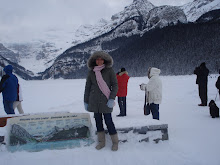Nowadays, we are living progress, that's why we may understand civilization as modernity. A modernity that is growing faster and it is mainly related with technological and scientific progresses that are giving us highest levels of knowledge that are generating a better social welfare.
The world is facing a cultural globalization, which tends to become in the main prototype to all humanity. Referring to civilization in this sense of globalization means that there is a unique and common modernity, one group of universal culture.
We have to let that this universal culture make us have things in common and not to discriminate other cultures or civilizations because they have a different language or color. Lets build a multicultural world where we can share and live in peace. Maybe these could be the steps to keep our civilization alive.







1 comment:
Hi Karen,
I love the picture you´ve chosen!! It gives hope, it depicts your own beliefs, which are very well expressed at the end of your entry.
You´ve have mentioned the main aspects of civilization and culture. You´ve also reflected on modernity, progress, welfare and globalization. In that sense, what aspects of globalization would you emphasise so that differences are accepted? How would your ideals of a multicultural world impact you as a future English teacher?
Good job!!
Claudia
Post a Comment